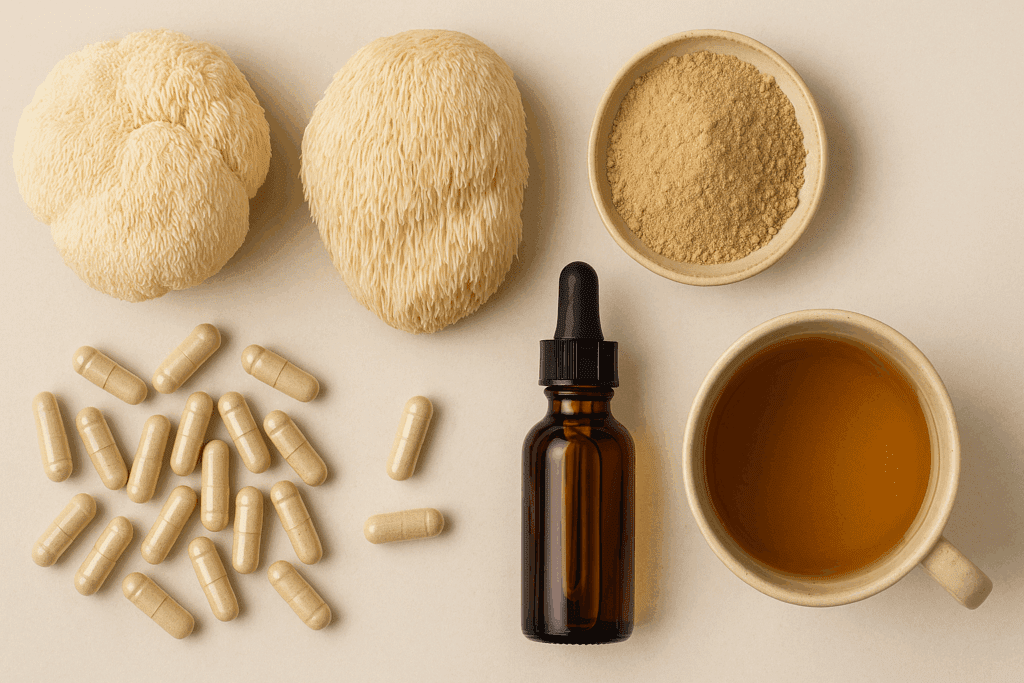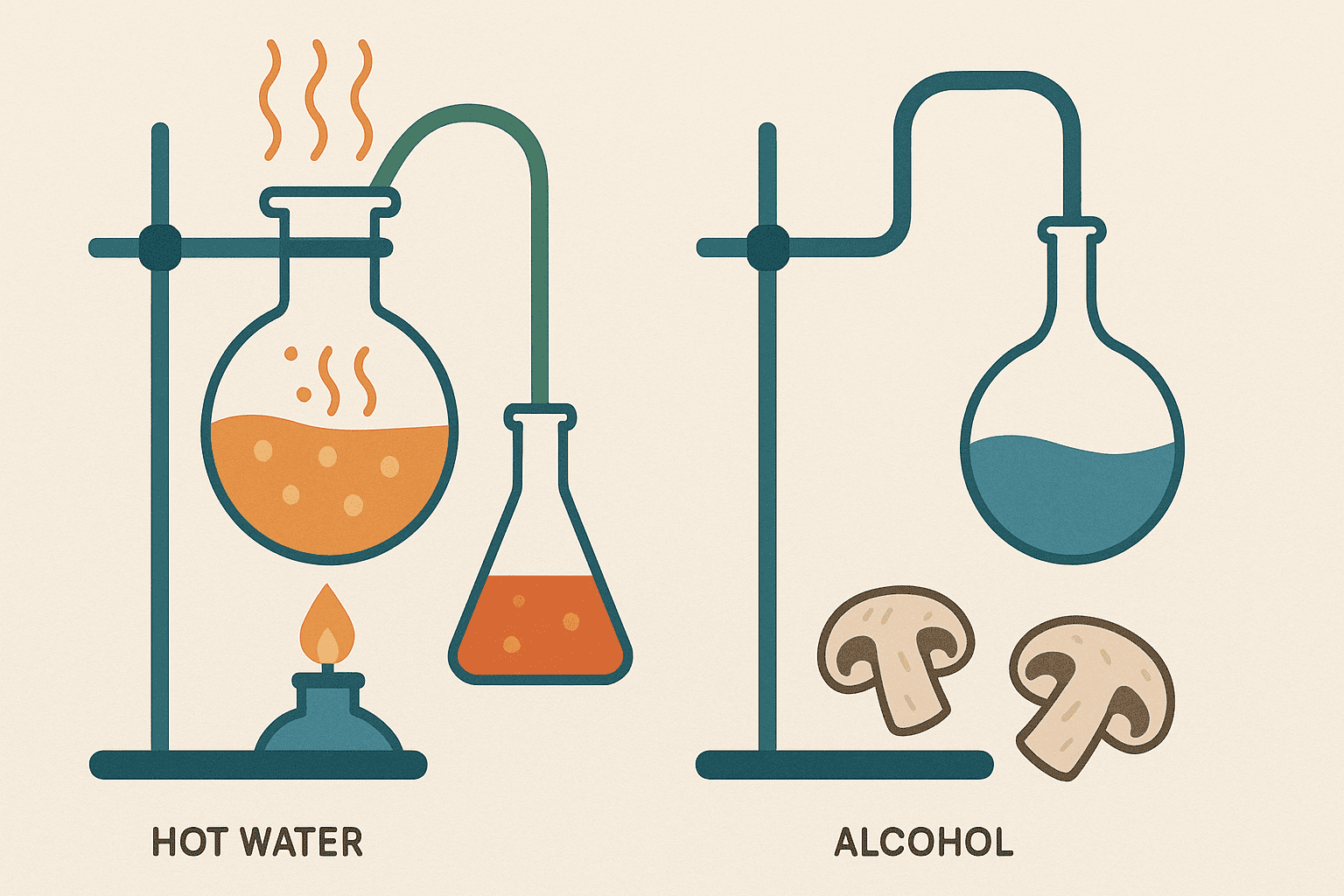Introduction: Understanding the Power of Lion’s Mane for Brain Health
In the growing world of natural nootropics, organic lion’s mane stands out as one of the most promising natural supplements for cognitive support and mental clarity. With the rise of research supporting the brain-boosting benefits of lion’s mane capsules, consumers are increasingly interested in finding the highest quality products available. Choosing a real lion’s mane supplement that delivers tangible results requires careful evaluation of sourcing, manufacturing practices, ingredient purity, and scientific backing. In this guide, we will explore how to distinguish between the different options on the market, what to look for in organic lion’s mane supplements, and how the right product can contribute significantly to cognitive health and brain support.
You may also like: How Lion’s Mane Supplements May Support ADHD and Cognitive Clarity: What Science Says About Lions Mane for Focus and Brain Health
What is Lion’s Mane and Why It Matters
Lion’s mane, scientifically known as Hericium erinaceus, is a medicinal mushroom that has been revered in traditional Eastern medicine for centuries. It is celebrated for its neuroprotective compounds, particularly hericenones and erinacines, which have been shown in research studies to stimulate nerve growth factor (NGF) production in the brain. NGF plays a crucial role in the maintenance, survival, and regeneration of neurons. Choosing organic lion’s mane over conventionally grown varieties ensures that the supplement is free of harmful pesticides and contaminants, which can diminish its natural benefits. When seeking lions mane capsules for cognitive health, it is important to understand not only the mushroom’s impressive history but also its growing body of modern scientific validation.

The Importance of Choosing Organic Lion’s Mane
Opting for organic lion’s mane is more than just a preference for clean, sustainable agriculture. Organic certification ensures that the lion’s mane mushrooms were cultivated without synthetic fertilizers, harmful pesticides, or genetically modified organisms. This purity is critical because mushrooms are highly bioaccumulative, meaning they absorb substances from their environment, both good and bad. Choosing a real lion’s mane supplement that is certified organic minimizes exposure to unwanted toxins and maximizes the mushroom’s natural potency. Consumers should look for USDA organic labels or reputable third-party certifications that guarantee adherence to strict organic standards.
Understanding the Different Forms of Lion’s Mane Supplements
Lion’s mane is available in a variety of supplement forms, including powders, capsules, tinctures, and teas. For those seeking convenience and consistent dosing, lions mane capsules are often the preferred choice. Capsules are easy to incorporate into daily routines and ensure precise amounts of active compounds. However, not all capsules are created equal. The best organic lions mane capsules contain either fruiting body extract, full-spectrum powder, or a combination of both. Fruiting body extracts are prized for their higher concentration of bioactive compounds compared to products made from mycelium on grain. Understanding the difference between these forms is essential when selecting the most effective supplement.

Why Fruiting Body Extracts Are Superior
In the world of lion’s mane supplementation, the distinction between fruiting body and mycelium-based products is crucial. The fruiting body refers to the visible part of the mushroom, while the mycelium is the underground network of filaments. Although mycelium does possess some beneficial compounds, the majority of the potent cognitive-supporting elements are found in the fruiting body. When selecting lions mane capsules, prioritize products made primarily from fruiting body extracts. Real lions mane supplements that focus on fruiting bodies typically boast higher concentrations of hericenones and erinacines, leading to more pronounced cognitive benefits.
Identifying a Real Lion’s Mane Supplement: What to Look For
With the explosion of interest in adaptogenic mushrooms, not all products on the market are equally trustworthy. To identify a real lions mane supplement, consumers should pay close attention to several key indicators. First, transparency in labeling is non-negotiable. A high-quality supplement will clearly state whether it uses fruiting body or mycelium, disclose extraction methods, and provide information about the cultivation process. Secondly, independent third-party testing for purity and potency should be standard practice, ensuring that the product is free from contaminants and that the active compounds are present at clinically effective levels. Finally, examining customer reviews and company reputation can offer additional insights into the reliability of a particular brand.

The Role of Extraction Methods in Supplement Quality
Extraction methods play a significant role in the effectiveness of lions mane capsules. Hot water extraction is the traditional method used to concentrate the polysaccharides and beta-glucans, which are important for immune modulation and brain health. Some companies also employ dual extraction techniques, combining hot water and alcohol to capture both water-soluble and fat-soluble compounds, thereby maximizing the supplement’s therapeutic potential. Choosing organic lions mane products that utilize these advanced extraction methods ensures that you receive the full spectrum of bioactive compounds necessary for cognitive support.
How to Read Supplement Labels for Maximum Benefit
Deciphering supplement labels can be daunting, but understanding key elements can empower consumers to make informed choices. Look for clear mentions of “fruiting body extract,” “dual extraction,” and standardized percentages of polysaccharides or beta-glucans. Avoid products that list “mycelium on grain” as the primary ingredient, as these typically contain lower concentrations of the desired active compounds. Furthermore, a real lions mane supplement will specify the extraction ratio, such as 8:1 or 10:1, indicating the concentration strength relative to the raw mushroom.
Understanding Dosage: How Much Lion’s Mane Do You Need?
Determining the right dosage is critical for achieving optimal cognitive benefits. Most studies suggest that a daily intake of 500 to 3,000 milligrams of lion’s mane extract supports neurogenesis and mental clarity. However, the specific dosage can vary depending on the concentration of active compounds and the extraction method used. High-quality lions mane capsules typically provide standardized dosages that align with clinical research findings. It is important to start with the recommended dosage on the product label and adjust based on personal response and guidance from a healthcare professional.

Potential Cognitive Benefits of Organic Lion’s Mane
The cognitive benefits of organic lions mane are well-documented in both traditional and modern scientific literature. Regular supplementation has been associated with improved memory, enhanced focus, greater mental clarity, and even mood regulation. Hericenones and erinacines stimulate NGF production, which is vital for neuronal growth and repair. Some studies also suggest that lion’s mane may offer neuroprotective effects against age-related cognitive decline. Choosing a real lions mane supplement ensures that you are accessing these powerful benefits without unnecessary additives or contaminants that could compromise efficacy.
How to Differentiate Between High-Quality and Low-Quality Brands
Not all brands uphold the same standards of quality, which can significantly impact the effectiveness of the supplement. High-quality brands typically invest in organic cultivation, advanced extraction methods, and third-party testing, all of which contribute to superior products. They are transparent about their sourcing and manufacturing practices and are willing to share certificates of analysis upon request. Low-quality brands, on the other hand, may prioritize profit over purity, cutting corners with cheap fillers, subpar raw materials, and insufficient testing. Discerning consumers should prioritize brands that uphold the highest standards in every aspect of production.
Common Mistakes When Choosing Lion’s Mane Supplements
One of the most common mistakes consumers make is selecting products based solely on price. While affordability is important, choosing the cheapest lions mane capsules often results in lower potency and compromised quality. Another frequent error is overlooking the form of the mushroom used; opting for mycelium-based products when seeking cognitive benefits typically yields disappointing results. Lastly, failing to verify third-party testing can expose consumers to supplements contaminated with heavy metals, mold, or other undesirable substances. Taking the time to thoroughly research and evaluate options can make a significant difference in outcomes.
The Growing Popularity of Lions Mane Capsules in Brain Health Regimens
The popularity of lions mane capsules has soared in recent years, driven by a growing body of research supporting their efficacy for brain health. More individuals are turning to natural supplements to enhance cognitive performance, manage stress, and support long-term mental wellness. Lions mane is unique in its ability to not only provide immediate mental clarity but also to promote lasting neurological health through NGF stimulation. This dual action makes it an attractive addition to holistic brain health regimens, appealing to students, professionals, and aging populations alike.
Sustainability and Ethical Considerations in Lion’s Mane Production
Sustainability is becoming an increasingly important factor in supplement selection. Organic lions mane cultivation supports ecological balance by avoiding harmful chemicals and promoting biodiversity. Ethical companies also prioritize fair labor practices and environmental stewardship, ensuring that their products contribute positively to both human and planetary health. By choosing a real lions mane supplement from an ethical brand, consumers can align their purchasing decisions with their values, supporting industries that prioritize sustainability and social responsibility.

Frequently Asked Questions (FAQ) About Choosing the Best Organic Lion’s Mane and Lion’s Mane Capsules
1. How can I verify that a lion’s mane supplement is genuinely organic?
When searching for a reliable organic lions mane product, it is essential to look for official certifications such as USDA Organic or certifications from reputable third-party organizations. These certifications ensure that the lion’s mane was cultivated without synthetic fertilizers, harmful pesticides, or genetically modified organisms. Beyond the label, requesting a certificate of analysis (COA) from the manufacturer can provide additional assurance regarding purity and authenticity. Companies committed to transparency will often share detailed lab results showing that their lions mane capsules meet organic standards. Selecting a real lions mane supplement with verifiable organic credentials greatly enhances the likelihood of obtaining a potent, clean product.
2. Why is dual extraction important when choosing lions mane capsules?
Dual extraction involves using both hot water and alcohol to extract the full range of bioactive compounds from the mushroom, including polysaccharides and terpenoids. Organic lions mane subjected to dual extraction typically exhibits a broader spectrum of benefits compared to products made using only one extraction method. Hot water extraction captures water-soluble compounds that support immunity, while alcohol extraction draws out fat-soluble molecules that influence cognitive functions. Therefore, lions mane capsules crafted with dual extraction methods deliver a richer, more effective blend of active ingredients. Choosing a real lions mane supplement that mentions dual extraction on the label is a wise move for those prioritizing comprehensive brain support.
3. Are there noticeable differences between lions mane capsules made from U.S.-grown versus imported mushrooms?
Yes, there can be meaningful differences. Organic lions mane grown in the United States is subject to stringent agricultural regulations, ensuring cleaner growing environments and better transparency in production practices. Imported lion’s mane, while sometimes of high quality, may come from regions with less stringent pesticide regulations. Additionally, U.S.-grown lions mane capsules often have fresher harvest-to-supplement timelines, which can affect the preservation of bioactive compounds. When evaluating a real lions mane supplement, it is worth considering the origin of the mushrooms as part of your overall quality assessment.
4. What are the potential long-term benefits of consistent organic lions mane use?
Consistent use of organic lions mane over an extended period may not only enhance immediate cognitive functions like focus and memory but could also contribute to long-term brain resilience. Research suggests that lion’s mane stimulates nerve growth factor (NGF), a protein essential for neuronal health and plasticity. Sustained intake of lions mane capsules may, therefore, support the brain’s ability to adapt, repair, and form new connections, particularly beneficial as the brain ages. Those who prioritize sourcing a real lions mane supplement that maintains high bioactive content are more likely to experience these cumulative neurological advantages. This aspect of preventative brain care is a growing focus in the field of functional nutrition.
5. How does the drying method impact the quality of lions mane capsules?
Drying methods play a pivotal role in preserving the active constituents of organic lions mane. Low-heat, slow drying techniques retain a greater proportion of polysaccharides and hericenones, the compounds most associated with cognitive support. In contrast, high-heat or rapid drying processes can degrade these sensitive compounds, resulting in less effective lions mane capsules. Consumers looking for a real lions mane supplement should inquire about drying practices or choose brands that specify “low-temperature drying” on their packaging. Attention to this behind-the-scenes detail can significantly impact the supplement’s efficacy.
6. What new innovations are emerging in lions mane supplement formulations?
The functional mushroom market is evolving rapidly, and recent innovations include liposomal delivery systems for organic lions mane, which aim to improve absorption and bioavailability. Some companies are also combining lions mane capsules with synergistic ingredients like phosphatidylserine, bacopa monnieri, or L-theanine to create more comprehensive nootropic blends. Another trend involves using DNA verification to authenticate the species used in real lions mane supplements, ensuring genetic accuracy and maximum therapeutic potential. These cutting-edge developments offer consumers exciting new ways to leverage lions mane’s brain-supportive properties more efficiently than ever before.
7. How does “lions made” on packaging relate to supplement authenticity?
When encountering the term “lions made” on supplement packaging, it is important to proceed carefully. While it sometimes refers to branding strategies, it can also be a mislabeling red flag if it replaces clear identification of “lion’s mane” as the primary ingredient. True organic lions mane supplements will precisely list “Hericium erinaceus” and offer comprehensive ingredient transparency. Lions mane capsules should never leave doubt about their main constituents, and reputable manufacturers will avoid vague or misleading terminology. Prioritizing a real lions mane supplement with transparent ingredient disclosures ensures that you are purchasing an authentic, effective product.
8. Can organic lions mane support emotional well-being in addition to cognitive health?
Emerging research indicates that organic lions mane may have a positive impact on emotional resilience by modulating neuroinflammation and promoting neurogenesis. Clinical studies suggest that regular use of lions mane capsules could help alleviate mild symptoms of anxiety and depression by encouraging healthier brain signaling pathways. Importantly, choosing a real lions mane supplement with standardized active compounds enhances the likelihood of experiencing these mood-related benefits. While not a substitute for professional mental health care, lion’s mane may be a valuable adjunct in a comprehensive wellness plan focused on emotional and cognitive balance.
9. Are there specific populations who benefit most from real lions mane supplements?
Although organic lions mane offers broad-spectrum benefits, certain groups may derive particularly strong advantages. Older adults seeking to preserve memory and executive function often find lions mane capsules to be a supportive addition to their routines. Additionally, students, professionals in high-cognitive-demand fields, and individuals recovering from mild neurological injuries may experience notable cognitive enhancements. Athletes interested in neuroplasticity for quicker reflexes and mental agility also turn to real lions mane supplements. Personalizing supplementation based on lifestyle, cognitive demands, and age-related goals can optimize the benefits of organic lion’s mane.
10. How can I incorporate organic lions mane into a comprehensive brain health regimen?
Incorporating organic lions mane into a broader brain health strategy involves more than just taking lions mane capsules daily. Pairing supplementation with a nutrient-dense diet rich in omega-3 fatty acids, antioxidants, and phytonutrients can amplify cognitive benefits. Engaging in regular physical exercise, practicing mindfulness, and prioritizing restorative sleep further enhance the neuroplastic effects that real lions mane supplements support. Forward-thinking health practitioners often recommend stacking lion’s mane with other evidence-based adaptogens to create synergistic cognitive outcomes. Thoughtfully integrating organic lions mane into a holistic brain wellness plan offers a powerful avenue for cultivating long-term mental vitality.

Conclusion: Making the Right Choice for Cognitive Health and Brain Support
Choosing the best organic lions mane and lions mane capsules for cognitive health and brain support requires more than a casual glance at product labels. It demands a careful evaluation of sourcing, extraction methods, ingredient quality, and brand transparency. Prioritizing supplements made from fruiting body extracts, verified through third-party testing, and sourced from organic cultivation ensures that consumers receive a real lions mane supplement capable of delivering genuine cognitive benefits. As interest in natural nootropics continues to rise, selecting high-quality lions mane products becomes not just a matter of preference but an essential step toward safeguarding mental clarity and promoting long-term neurological health. By making informed decisions grounded in scientific understanding and ethical considerations, individuals can fully harness the profound potential of organic lions mane for enhanced cognitive vitality.
Further Reading:
9 Health Benefits of Lion’s Mane Mushroom (Plus Side Effects)
Organic Lions Mane Extract Capsules
Health Benefits of Lion’s Mane Mushrooms
Was this article helpful? Don’t let it stop with you. Share it right now with someone who needs to see it—whether it’s a friend, a colleague, or your whole network. And if staying ahead on this topic matters to you, subscribe to this publication for the most up-to-date information. You’ll get the latest insights delivered straight to you—no searching, no missing out.
Important Note: The information contained in this article is for general informational purposes only, and should not be construed as health or medical advice, nor is it intended to diagnose, prevent, treat, or cure any disease or health condition. Before embarking on any diet, fitness regimen, or program of nutritional supplementation, it is advisable to consult your healthcare professional in order to determine its safety and probable efficacy in terms of your individual state of health.
Regarding Nutritional Supplements Or Other Non-Prescription Health Products: If any nutritional supplements or other non-prescription health products are mentioned in the foregoing article, any claims or statements made about them have not been evaluated by the U.S. Food and Drug Administration, and such nutritional supplements or other health products are not intended to diagnose, treat, cure, or prevent any disease.


